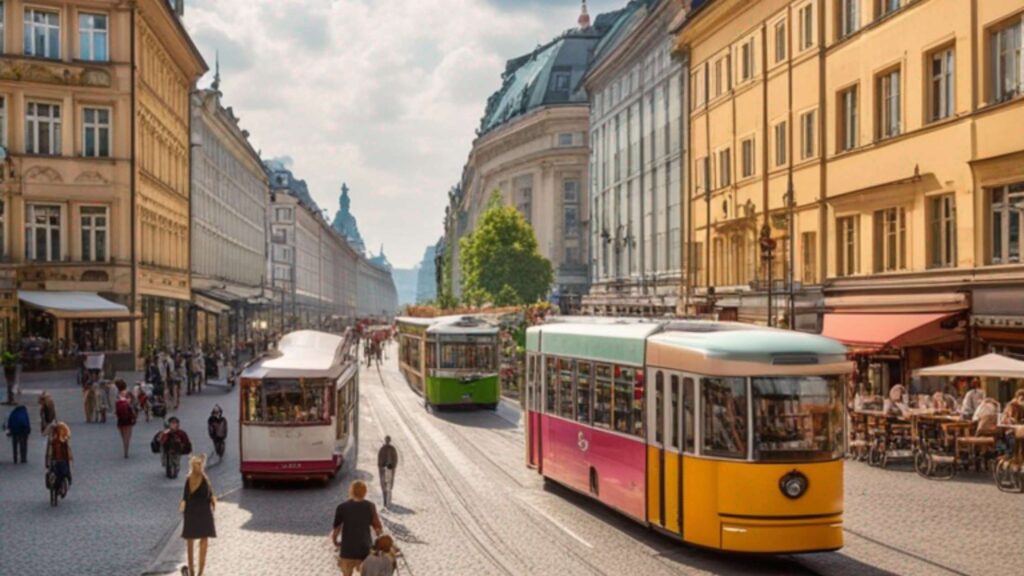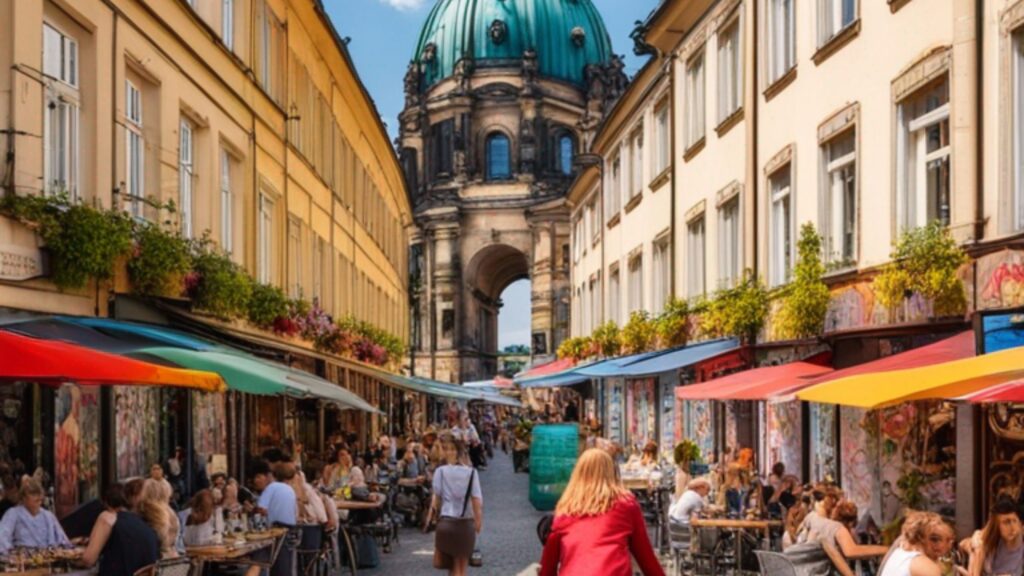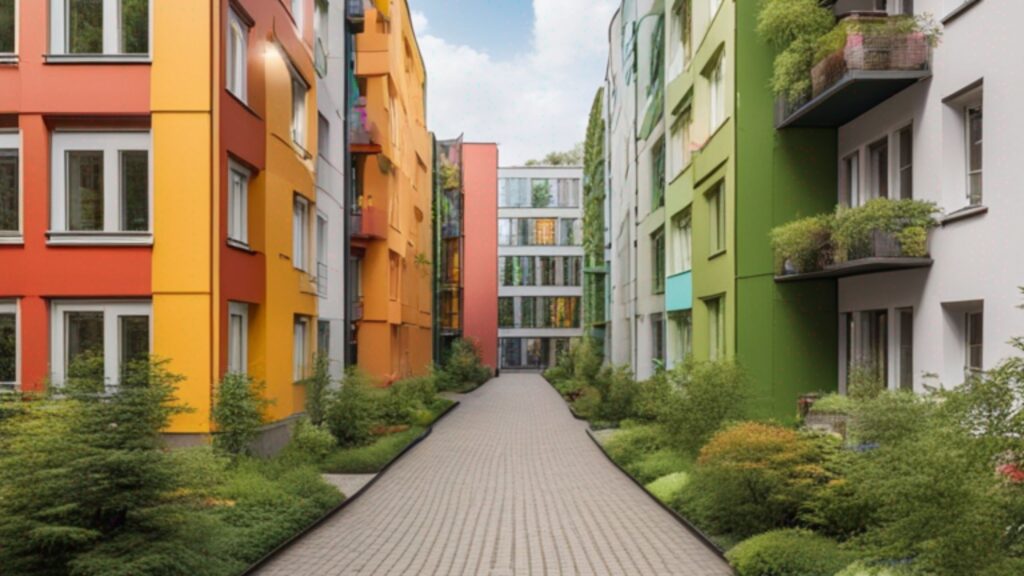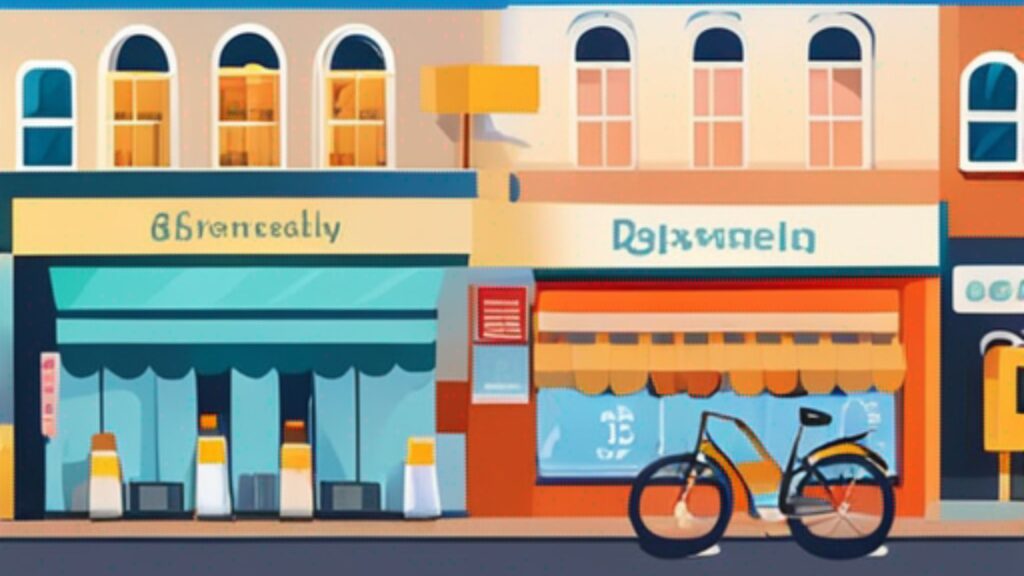Living in Berlin presents a blend of vibrant culture, historical significance, and modern convenience that attracts a wide array of people from across the globe, including a substantial community of expatriates.
As Germany’s capital city, Berlin is noted for its affable and open atmosphere, where newcomers frequently appreciate the city’s progressive spirit and the ease with which they can integrate into local life.

The city’s lifestyle is characterized by a rich tapestry of experiences, from the tranquility of its numerous parks and green spaces to the ceaseless bustle of its diverse neighborhoods.
Expats often find the balance between work and life particularly appealing, as well as the affordability of living when compared to other major European cities.
Berlin’s eclectic nature is reflected in its neighborhoods, each offering different flavors—from the artistic flair of Kreuzberg to the historic charm of Mitte.
Moreover, Berlin’s reputation as a good place to live is bolstered by its robust public transportation, profusion of cultural activities, and openness to innovation and creativity.
The city’s storied past and dynamic present meet to create a unique environment where both local residents and the international community enjoy the high quality of life.
Adapting to Berlin can vary in ease, but with the city’s international vibe and supportive expat networks, many find their niche in this distinctive metropolis.
Culture and Lifestyle

Berlin’s culture and lifestyle are as vibrant and varied as its history. The city’s liberal and diverse atmosphere is palpable, reflected in its rich cultural tapestry and active lifestyle that both locals and expats relish.
Arts and Music Scene
Berlin boasts a dynamic arts and music scene that ranges from traditional to avant-garde. Museums and galleries feature works by both renowned and emerging artists.
The city is also a hub for music lovers, with venues and opera houses that host everything from classical concerts to cutting-edge techno performances. The East Side Gallery, a remnant of the Berlin Wall, has become an iconic open-air gallery.
Food and Culinary Experiences
The culinary experiences in Berlin are a testament to its international appeal. From savory Turkish dishes to German classics like sausages and beer, Berlin’s food scene is delightfully diverse.
Food markets and street food stalls offer an eclectic mix of flavors that caters to all tastes and reflects the city’s cosmopolitan nature.
History and Heritage
Berlin’s history and heritage are deeply intertwined with the global narrative of the 20th century. Notable historical sites include remnants of the Cold War and the Berlin Wall, which serve as somber reminders of the past.
Museums across the city carefully preserve this legacy, providing insight into the events that have shaped Berlin and the world.
Nightlife and Entertainment
The nightlife in Berlin is one of the city’s most electrifying aspects, with a plethora of bars, clubs, and lounges.
Renowned for its techno clubs, Berlin attracts worldwide party-goers. The city’s liberal attitude is especially evident once the sun sets, and the vibrant party scene comes to life.
Outdoor and Green Spaces
Berlin is well-known for its commitment to green space and the outdoors, with parks and gardens such as the spacious Tempelhofer Feld offering residents a place to relax and socialize. These urban oases provide a refreshing contrast to the bustling city life, creating a balance that those living in Berlin appreciate.
Local Events and Festivals
Throughout the year, Berlin hosts a variety of local events and festivals that celebrate its rich cultural makeup. Ranging from film festivals to music and art events, there’s always something happening.
These gatherings not only entertain but also foster community spirit and showcase the city’s embrace of various cultures.
Accommodation and Neighborhoods

Berlin offers a diverse range of accommodations and neighborhoods, each with its own unique character. Understanding the housing market and various districts can greatly enhance the living experience in this vibrant city, whether one is an expat, student, or professional.
Choosing a Neighborhood
When moving to Berlin, the first critical step is determining which neighborhood aligns with one’s lifestyle and needs. Areas such as Mitte are central and filled with historical sites, while Prenzlauer Berg is known for its family-friendly atmosphere.
Housing Market Overview
Berlin’s housing market is competitive, with demand often exceeding supply. Renting is more common than purchasing, and prices vary significantly by district. Unexpectedly affordable neighborhoods can still be found compared to other major cities.
Living as an Expat
The expat community in Berlin is thriving, especially in neighborhoods such as Friedrichshain and Kreuzberg, known for their open-mindedness and diverse cultural scenes.
Family-Friendly Areas
Charlottenburg and Pankow offer spacious housing and access to quality schools, making them ideal for families looking for a balance between city life and peaceful green spaces.
Student and Creative Hubs
Friedrichshain and Neukölln are magnets for students, artists, and creatives, offering vibrant nightlife, eclectic art scenes, and relatively affordable living options.
Areas Popular with Professionals
Busy professionals often favor neighborhoods like Mitte or Charlottenburg, where the proximity to business districts and upscale amenities is a significant draw.
Community and Safety
Berlin is a generally safe city with a strong sense of community. Neighbors often know each other, and areas like Prenzlauer Berg are known for their tight-knit communities.
Lifestyle in Different Districts
Each district in Berlin offers a distinct lifestyle; from Marzahn-Hellersdorf‘s quieter, suburban feel to Prenzlauer Berg‘s lively, urban atmosphere, there’s something for everyone.
Gentrification and Its Impact
Gentrification is reshaping many neighborhoods in Berlin, bringing both positive changes and challenges, particularly in districts like Kreuzberg and Neukölln.
Real Estate Investment
With the city’s growth, investing in real estate in up-and-coming neighborhoods such as Lichtenberg or Spandau can be a potential opportunity for those looking to enter the market.
Public Transportation Access
Berlin’s excellent public transportation system makes it easy to access from nearly any neighborhood. Whether one prefers the bus, metro, or tram, commuting is typically straightforward and convenient.
Costs and Expenses

Living in Berlin, Germany, can be a balance of affordability and lifestyle. The city’s cost of living is notable for being budget-friendly compared to other major European capitals, though expenses can vary depending on lifestyle choices and personal circumstances.
Understanding Cost of Living
The cost of living in Berlin is often considered reasonable, with an efficient balance between salary and living costs. It’s known to offer a good quality of life that can be aligned with a range of budget-friendly options. Expenses such as rent, groceries, and public transport are typically lower than in cities like London or Paris.
Transport and Mobility
Berlin’s public transport system is extensive and reliable, making a car unnecessary for most residents. A one-way ticket costs about €3.20, while a monthly pass is reasonably priced at €49.99. For those who prefer personal vehicles, it’s important to note that gas prices are usually higher in Europe.
Healthcare and Insurance
Health insurance is mandatory in Germany, and the system provides high standards of healthcare. Costs can vary depending on whether one opts for public or private health insurance, but overall the system is effective and accessible.
Utilities and Other Monthly Costs
Monthly utilities for an 85m2 apartment, including electricity, heating, cooling, water, and internet, can range from €150 to €250. This will vary based on individual usage and the time of year.
Grocery and Food Budgeting
Groceries in Berlin are affordable, and there are plenty of options for all budgets. Residents can shop at discount supermarkets or opt for organic food stores. Eating out is also budget-friendly, with a mid-range restaurant meal typically costing between €10 to €20 per person.
Entertainment and Recreation Costs
Berlin is known for its vibrant nightlife, with bars and clubs that cater to a range of tastes and budgets. A bottle of beer in a supermarket is about €1.00, while a drink at a bar will cost more. In terms of green space, the city provides ample parks and lakes, which are free to enjoy.
Work and Education
Berlin, renowned for its vibrant culture and dynamic job market, provides ample employment opportunities and boasts a robust education system. The city is a magnet for expats seeking to advance their careers or pursue academic aspirations.
Job Market and Employment
The job market in Berlin is diverse, with a significant presence of creative industries, tech startups, and service sectors. A thriving international community contributes to the diverse job opportunities available in the German capital.
Salaries in Berlin may vary widely depending on the industry and level of expertise, but the city is known for a quality of life that can justify the cost of living.
Networking plays a critical role in job hunting, with many positions filled through connections rather than traditional applications. The unemployment rate has been a challenge, yet the city’s job market continues to grow, attracting talent from across the globe.
Education System and Schools
Berlin offers a comprehensive education system, from kindergartens to secondary schools. Students benefit from a curriculum that balances academic rigor with cultural enrichment.
The city provides a variety of schooling options, including public, private, and international schools, catering to the diverse needs of its residents.
The quality of education in Berlin is generally high, with schools focusing not only on academic excellence but also on fostering critical thinking and multicultural understanding.
Universities and Higher Education
Home to several world-renowned universities, Berlin stands out as an educational hub in Germany.
Institutions like the Humboldt University of Berlin and the Free University of Berlin attract a large number of students, including internationals, due to their wide range of programs and research opportunities.
These universities offer courses in English and German, and they actively participate in international exchange and research networks.
Higher education in Berlin is characterized by a combination of theoretical knowledge and practical application, made possible through partnerships with leading companies and organizations.
Social and Integration
Living in Berlin as an expatriate can be both invigorating and challenging. Successful social and cultural integration hinges on embracing the local communities, understanding the potential hurdles, effective communication in German, and utilizing practical tips for establishing a new life in Germany’s capital.
Communities and Networking
Berlin’s cosmopolitan makeup includes a vibrant expat community, alongside significant Turkish and Arab populations. Expats often gravitate towards neighborhoods like Prenzlauer Berg and Kreuzberg, where networking events and international meet-ups thrive.
Online platforms, such as Expatica, provide expatriates with guides on social norms and etiquette, facilitating smoother interpersonal interactions.
Challenges of Integration
Adapting to life in a new city comes with obstacles; expatriates may face bureaucratic hurdles such as the Anmeldung (registration) process, or securing a visa. Cultural differences can manifest in daily life, affecting aspects from work to leisure.
Guides like iHeartBerlin’s article on German integration can aid expatriates in acclimatizing to the German way of life, including the art of local complaint.
Language and Communication
Fluency in the German language is a crucial facet of blending into Berlin life. While English is widely spoken, knowing German not only simplifies bureaucratic processes but also enriches social experiences.
Language courses and conversational meetups are abundant, supporting foreigners in their quest to communicate effectively and integrate more deeply.
Relocation Tips
When moving to Berlin, there are several tips to ease the transition. Organize documents well in advance of the move, especially for the Anmeldung and visa applications.
Researching the cost of living can help in financial preparations, and the Deutsche Welle’s guide may serve as a roadmap to understanding the various steps involved in setting up life in the German capital.
Legal and Administrative Aspects
Navigating the legal and administrative framework is a crucial step for anyone considering a move to Berlin. It involves understanding residency requirements, managing finances effectively, and learning to cope with German bureaucracy, which can be quite distinct from other countries.
Residency and Visas
Residency in Berlin starts with obtaining the correct visa—non-EU nationals will need one before they can live or work in the city. Visas range from work and student visas to family reunion and freelance visas. It’s important to apply for the correct one, aligning with the purpose of stay.
Upon arrival, registration of address at the local residency office (Anmeldung) is mandatory. This registration is critical as it’s needed for many other processes, such as opening a bank account or enrolling for health insurance.
Banking and Finances
A German bank account is essential for everyday financial transactions and receiving a salary. To open an account, residents often need proof of residence, passport, and, in some cases, a visa.
Germany’s banking system is well-developed with options for both traditional and digital banking services. It’s important to consider banking fees and the availability of English-language services, especially for those who are not fluent in German.
Understanding German Bureaucracy
German bureaucracy can seem overwhelming due to its structurally detailed nature. Key public services, including registration offices (Bürgerämter), operate with a strict adherence to protocol.
Expats should be prepared for ample paperwork and possibly long waits for appointments. It is advisable to gather all required documents for each administrative task and to understand that appointments are often mandatory.
While many Berliners do speak English, not all governmental correspondence is available in English which could necessitate a basic understanding of the German language.
Health and Safety
Living in Berlin, Germany, provides a robust healthcare system and a reputation for being a safe city. Residents have access to high-quality medical care, and the city’s safety measures make it an appealing destination for expats and locals alike.
Healthcare System Overview
Berlin’s healthcare system is renowned for its efficiency and quality. Health insurance is mandatory for everyone residing in the city, ensuring that both locals and foreigners have access to the medical services they need.
The German healthcare system operates on a dual public and private insurance model, with the majority of the population being covered by Statutory Health Insurance (GKV).
Expats in Berlin, especially those from non-EU countries, should be aware that they need proper health insurance coverage to apply for a visa. Once registered, they can choose from a variety of health insurance providers that best suit their needs and coverage preferences.
Safety in the City
When it comes to safety, Berlin is considered a relatively safe city to live in when compared with other major European capitals. While some areas may experience more petty crimes like theft, overall, violent crimes are uncommon.
The city takes a proactive approach to safety, with visible police presence and emergency services readily available. This has contributed to Berlin’s allure to the expat community, which continues to thrive in a safe and well-ordered environment.
Moreover, several online resources and guidebooks, such as Original Berlin Tours, provide comprehensive guides to safety in the city, reassuring residents and potential movers about their welfare in Berlin.
Arts and Attractions
Berlin stands as a cultural beacon in Germany, marked by its tumultuous history and the vibrant art scene that has emerged from it. The city boasts a diverse array of museums and galleries, a thriving street art community that narrates its modern saga, and historical monuments that serve as silent witnesses to its past.
Museums and Galleries
Berlin’s Museum Island, a UNESCO World Heritage site, is the nexus of its rich cultural heritage, housing world-renowned institutions like the Pergamon Museum and Altes Museum.
These repositories offer a deep dive into the ancient world, with vast collections of classical antiquities. Art lovers find a contemporary fix in the Hamburger Bahnhof or the Berlinische Galerie, which spotlight modern artists and the city’s own evolving art narrative.
- Notable Art Galleries:
- Hamburger Bahnhof
- Berlinische Galerie
- KW Institute for Contemporary Art
Street Art and Urban Culture
The remnants of the Berlin Wall have become canvases for expressions of freedom and the East Side Gallery stands as perhaps the largest open-air gallery worldwide.
Berlin is a city that speaks through its walls, with the vibrant street art scene reflecting its spirited urban culture. Street art tours are common, guiding residents and visitors through the colorful districts that showcase this contemporary art form.
- Iconic Street Art Locations:
- East Side Gallery
- Kreuzberg and Friedrichshain districts
Historical Monuments and Sites
Berlin’s historical landscape is punctuated by landmarks such as the Brandenburg Gate, which has borne witness to the nation’s tumultuous past from the Cold War to reunification.
Memorials like the Holocaust Memorial pay homage to darker chapters in human history, while the Checkpoint Charlie stands as a vestige of the Cold War era, reminding the current generation of the division that once defined the city.
- Significant Historical Sites:
- Brandenburg Gate
- Holocaust Memorial
- Checkpoint Charlie
Food and Dining
Berlin’s food scene reflects its status as an international metropolis, offering a vast array of culinary experiences. The city is a melting pot of flavors, providing something to suit every palate.
Traditional German Cuisine
The traditional German cuisine in Berlin is a hearty affair with dishes like Eisbein (pork knuckle) and Schnitzel being local favorites.
One can indulge in a range of sausages, including the famous Currywurst, a fast-food staple that is served with a curry-flavored ketchup and is especially popular among both the local residents and expatriates.
For those with a penchant for bread, the Pretzel or Brezel is a common find at bakeries across the city.
Dining in Berlin would be incomplete without mention of its beer culture. Germany’s renowned for its beer, and the capital city lives up to this reputation.
One will find an array of local brews, from the classic Pilsner to more robust options like Bock and Dunkel. Beer gardens, such as the Prater Garten, provide a laid-back environment to enjoy these beverages, particularly during the warm summer months.
Frequently Asked Questions
Berlin offers a diverse and vibrant urban experience, marking it as a sought-after destination for many expatriates, including Americans. Here we address some of the common inquiries about life in the German capital.
What are some pros and cons of residing in Berlin?
Berlin presents a tapestry of cultural offerings and a renowned nightlife, which are significant pros for those living in the city. However, the cost of living can be a hurdle, with unavoidable expenses such as healthcare, which remains a mandatory requirement for all residents.
How accommodating is Berlin for English-speaking expatriates?
While Berlin is quite international, with many expats and businesses using English, a working knowledge of German is crucial for job opportunities and deeper integration into the city’s fabric.
What are some challenges foreigners face when living in Berlin?
Challenges for foreigners in Berlin range from navigating the bureaucracy for visas and housing to experiencing a distinct cultural shift. The language barrier can also pose significant obstacles, particularly in official matters.
What attracts Americans to move to Berlin?
Americans are often drawn to Berlin’s rich history, robust art scene, and the relatively affordable cost of living compared to other global cities, which can be a strong pull for those looking to relocate.
How is the quality of life in Berlin compared to other German cities?
Berlin provides a unique combination of affordable living costs, a dense cultural landscape, and comprehensive public transportation, making the quality of life here often perceived as more liberal and vibrant than in other German cities.
What cultural adjustments should Americans expect when moving to Berlin?
Americans might need to adjust to a more relaxed pace of life in Berlin, where work-life balance is emphasized. There’s also a strong focus on environmental awareness and a more formal approach to social interactions.